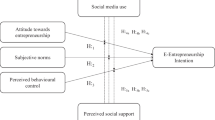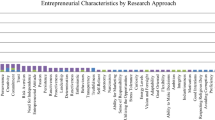Abstract
The present study focuses on the relationships between entrepreneurial characteristics (achievement orientation, risk taking propensity, locus of control, and networking), e-service business factors (reliability, responsiveness, ease of use, and self-service), governmental support, and the success of e-commerce entrepreneurs. Results confirm that the achievement orientation and locus of control of founders and business emphasis on reliability and ease of use functions of e-service quality are positively related to the success of e-commerce entrepreneurial ventures in Thailand. Founder risk taking and networking, e-service responsiveness and self-service, and governmental support are found to be non-significant.


Similar content being viewed by others
References
Acs, Z. J., Arenius, P., Hay, M., & Mininiti, M. (2004). Global entrepreneurship monitor: 2004 Executive report. MA: Babson College and UK: London Business School.
Applegate, L. M., Austin, R. D., & McFarlan, F. W. (2002). Creating business advantage in the information age. New York: McGraw-Hill.
Arenius, P. M., & Minniti, M. (2005). Perceptual variables and nascent entrepreneurship. Small Business Economics, 24, 233–247.
Begley, T. M., & Boyd, D. P. (1987). Psychological characteristics associated with performance in entrepreneurial firms and smaller businesses. Journal of Business Venturing, 2, 79–93.
Beugelsdijk, S. (2007). Entrepreneurial culture, regional innovativeness and economic growth. Journal of Evolutionary Economics, 17(2), 187–210.
Brockhaus, R. H. (1980). Risk taking propensity of entrepreneurs. Academy of Management Journal, 23(2), 509–520.
Bobbitt, L. M., & Dabholkar, P. A. (2001). Integrating attitudinal theories to understand and predict use of technology-based self-service: The internet as an illustration. International Journal of Service Industry Management, 12(5), 423–450.
Carlson, C. (2000). Customer service: An essential component for a successful website. Marketing Health Services, 20(2), 28–30.
Chung, K. H. (1987). Management: Critical success factors. Boston: Allyn and Bacon.
Churchill, G. A. (1979). A paradigm for developing better measures of marking construct. Journal of Marketing Research, 16, 64–73.
Colombo, M.G., & Grilli, L. (2006). Supporting high-tech start-ups: Lessons from Italian technology policy. International Entrepreneurship and Management Journal, 2, 189–209.
Companys, Y. E., & McMullen, J. S. (2007). Strategic entrepreneurs at work: The nature, discovery, and exploitation of entrepreneurial opportunities. Small Business Economics, 28, 301–322.
Dabholkar, P. A. (1996). Consumer evaluations of new technology-based self–service options: An investigation of alternative models of service quality. International Journal of Research in Marketing, 13, 29–51.
Damanpour, F. (2001). E-business e-commerce evolution: Perspective and strategy. Managerial Financial, 27(2), 16–33.
David, W., & Benamati, J. (2002). E-commerce basics. NJ: Prentice Hall.
De Ruyter, K., Wetzels, M., & Kleijnen, M. (2000). Customer adoption of e-service: An experimental study. International Journal of Service Industry Management, 12(2), 184–207.
Department of Business Development (2005). E-commerce registration. Retrieved October 7, 2005, from http://www.dbd.go.th/edirectory.
Durand, D. E. (1975). Effects of achievement motivation and skill training on the entrepreneurial behavior of black businessmen. Organizational Behavior and Human Performance, 14(1), 76–90.
Evans, D., & Volery, T. (2001). Online business development services for entrepreneurs: An exploratory study. Entrepreneurship and Regional Development, 13(4), 333–350.
Fariselli, P., Oughton, C., Picory, C., & Sugden, R. (1999). Electronic commerce and the future for SMEs in a global market-place: Networking and public policies. Small Business Economics, 12, 261–275.
Feindt, S., Jeffcoate, J., & Chappell, C. (2002). Identifying success factors for rapid growth in SME e-commerce. Small Business Economics, 19, 51–62.
Garelli, S. (2004). IMD world competitive yearbook: 2004 executive summary. Retrieved January 16, 2006, from http://www.imd.ch/research/publications/iwcy/index.cfm.
van Gelderen, M., Thurik, R., & Bosma, N. (2006). Success and risk factors in the pre-startup phase. Small Business Economics, 26, 319–335.
Global Entrepreneurship Monitor (2005). The definitive study of entrepreneurship in 2005. Retrieved October 16, 2006, from http://www3.babson.edu/Newsroom/Releases/globalgem11206release.cfm.
Gray, H., & Sanzogni, L. (2004). Technology leapfrogging in Thailand: Issues for the support of e-commerce infrastructure. The Electronic Journal on Information Systems in Developing countries, 16(3), 1–26.
Greenstein, M., & Vasarhelyi, M. (2002). Electronic commerce: Security, risk management, and control (2nd ed.). New York: McGraw-Hill.
Hackney, R., & Dunn, D. (2000). Business information technology management: Alternative and adaptive future. New York: Palagrave.
Hagg, S., Cummings, M., & Dawkins, J. (2000). Management information systems for the information age (2nd ed.). New York: McGraw-Hill.
Hair, J., Anderson, R., Tatham, R., & Black, W. (1998). Multivariate data analysis (5th ed.). NJ: Prentice Hall.
Hansemark O. C. (2003). Need for achievement, locus of control and the prediction of business start-ups: A longitudinal study. Journal of Economic Psychology, 24(3), 301–319.
Hoffman, D.L., & Navak, T. P. (1996). Marketing in hypermedia computer-mediated environments: Conceptual foundations. Journal of Marketing, 60, 50–68.
Ibrahim, A. B., & Ellis, W. H. (1993). Entrepreneurship and small business management: Text, readings, and cases (2nd ed.). Dubuque, IA: Kendall/Hunt.
Ireland, R. D., Hitt, M. A., Camp, S. M., & Sexton, D. L. (2001). Integrating entrepreneurship and strategic management actions to create firm wealth. Academy of Management Executive, 15(1), 49–63.
Jeffcoate, J., Chappell, C., & Feindt, S. (2002). Best practice in SME adoption of e-commerce. Benchmarking: An international Journal, 9(2), 122–132.
Kase, K., & Liu, J. Y. (1996). Entrepreneurial networking in japanese management. International Marketing Review, 13(3), 13–23.
Kathuria, R., & Joshi, M.P. (2007). Environmental influences on corporate entrepreneurship: Executive perspectives on the internet. International Entrepreneurship and Management Journal, 3, 127–44.
Kaynama, K., & Black, H., (2000). A user-based design process for web sites. Systems and Services, 15(1), 35–44.
Knouse, S. B., & Webb, S. C. (2001). Virtual networking for women and minorities. Career Development International, 6(4), 226–228.
Korper, S., & Ellis, J. (1999). The e-commerce book: Building the e-empire (2nd ed.). New York: Academic Press.
Kurako, D. F., & Hodgetts, R. M. (1995). Entrepreneurship: A contemporary approach (3rd ed.). Texas: The Dryden Press.
Laudon, K. C., & Laudon, J. P. (2002). Management information systems: Managing the digital firm (7th ed.). NJ: Prentice Hall.
Lee, S. M., & Peterson, S. J. (2000). Culture, entrepreneurial orientation, global competitiveness. Journal of World Business, 35(4), 401–416.
Liao, C., Chen, J., & Yen, D. C. (2007). Theory of planning behavior (TPB) and customer satisfaction in the continued use of e-service: An integrated model. Computers in Human Behavior, 23(6), 2804–2822.
Lockett, A., & Littler, D. (1997). The adoption of direct banking services. Journal of Marketing Management, 13, 791–811.
Lumpkin, G. T., & Dess, G. G. (1996). Clarifying the entrepreneurial orientation construct and linking it to performance. Academy of Management Review, 21(1), 135–172.
Lumpkin, J. R., & Ireland, R. D. (1988). Screening practices of new business incubators: The evaluation of critical success factors. American Journal of Small Business, Spring, 59–81.
McClelland, D. C. (1961). The achieving society. NJ: Van Nostrand.
Moensted, M. (2007). Strategic networking in small high tech firms. International Entrepreneurship and Management Journal, 3, 15–27.
Norton, W. I., & Moore, W. T. (2006). The influence of entrepreneurial risk assessment on venture launch or growth decisions. Small Business Economics, 26, 215–226.
Nunnally, J. C. (1978). Psychometric theory (2nd ed.). New York: McGraw-Hill.
O’Neill, M., Palmer, A., & Wright, C. (2003). Disconfirming user expectations of the online service experience: Inferred versus direct disconfirmation modeling. Internet Research: Electronic Networking Applications and Policy, 13(4), 281–296.
Organization for Economic Co-operation, Development (1999). The economic and social impact or electronic commerce: Preliminary findings and research agenda. MA: Organization for Economic Co-operation and Development.
Poon, J. L., Ainuddin, R. A., & Junit, S. H. (2006). Effects of self-concept traits and entrepreneurial orientation on firm performance. International Small Business Journal, 24(1), 61–82.
Rawley, J. (2006). An analysis of the e-service literature: Towards a research agenda. Internet Research, 16(3), 339–359.
Reynolds, J. (2000). E-commerce: A critical review. International Journal of Retail and Distribution Management, 28(10), 417–444.
Reynolds, P. D., Bygrave, W. D., Autio, E., & Hay, M. (2002). Global entrepreneurship monitor: 2002 Executive report. Babson College, Ewing Marion Kauffman Foundation, and UK: London Business School.
Reynolds, P. D., Bygrave, W. D., & Autio, E. (2003). Global entrepreneurship monitor: 2003 global report. Boston, MA: Babson College and UK: London Business School.
Rockart, J. F. (1979). Chief executives define their own data needs. Harvard Business Review, 57(2), 81–93.
Rotter, J. B. (1966). Generalized expectancies for internal versus external control of reinforcement. Psychological Monographs, 80, 609–639.
Rust, R. T., & Kannan, P. K. (2002). E-service: New directions in theory and practice. New York: M.E. Sharpe.
Santos, F. (2003). E-service quality: A model of virtual service quality dimensions. Managing Service Quality, 13(3), 233–246.
Selnes, F., & Hansen, H. (2001). The potential hazard of self-service in developing customer loyalty. Journal of Service Research, 4(2), 79–90.
Shaver, K. G., & Scott L. R. (1991). Person, process, choice: The psychology of new venture creation. Entrepreneurship Theory and Practice, Winter, 23–45.
Stewart, W. H., Jr. & Roth, P. L. (2001). A meta-analysis of achievement motivation differences between entrepreneurs and managers. Journal of Small Business Management, 45(4), 401–421.
Surjadjaja, H., Ghosh, S., & Antony, F. (2003). Determining and assessing the determinants of e-Service operations. Managing Service Quality, 13(1), 39–53.
Turban, E., Lee, J., King, D., & Chung, H. M. (2000). Electronic commerce: A managerial perspective. New Jersey: Prentice Hall.
United Nations Conference on Trade and Development (2003). E-commerce and development report 2003. New York and Geneva: United Nations.
Van Reil, R., Semeijn, J., & Janssen, W. (2003). E-service quality expectations: A case study. Total Quality Management & Business Excellence, 14(4), 437–451.
Varadarajan, P. R., & Yadav, M. (2002). Marketing strategy and the internet: An organizing framework. Academy of Marketing Science Journal, 30(4), 276–312.
Voss, C. A. (2003). Rethinking paradigms of service-service in a virtual environment. International Journal of Operations and Production Management, 23(1), 88–104.
Zeithaml, V. A. (2002). Service excellence in electronic channels. Managing Service Quality, 12(3), 135–155.
Zeithaml, V. A., Parasuraman, A., & Malthotra, A. (2000). A conceptual framework for understanding e-service quality: Implications for future research and managerial practice. Working Paper, Report Nr. 00–115. Cambridge, MA: Marking Science Institute.
Author information
Authors and Affiliations
Corresponding author
Rights and permissions
About this article
Cite this article
Sebora, T.C., Lee, S.M. & Sukasame, N. Critical success factors for e-commerce entrepreneurship: an empirical study of Thailand. Small Bus Econ 32, 303–316 (2009). https://doi.org/10.1007/s11187-007-9091-9
Received:
Accepted:
Published:
Issue Date:
DOI: https://doi.org/10.1007/s11187-007-9091-9




